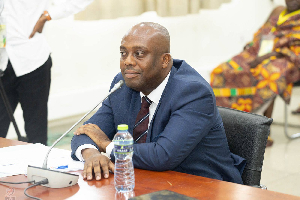Deputy Finance Minister-Designate Denies Claims of GHS 38 Billion Borrowing in First Month
Deputy Finance Minister-designate, Thomas Ampem Nyarko, has refuted claims that the new National Democratic Congress (NDC) government has borrowed over GHS 38 billion within its first four weeks in office.
His response follows concerns raised by Member of Parliament for Tano North, Dr. Gideon Boako, during the Appointments Committee vetting on Monday, February 24.
Dr. Boako questioned the government’s borrowing levels, arguing that despite the NDC’s campaign promise to reduce borrowing, it had already secured GHS 38.5 billion from the domestic market within its first month.
“If you follow the trend within January alone, contrary to what we have been told by the government that we want to cut the borrowing and bring the rates down, this government in four weeks has borrowed 38.5 billion cedis. That is not a good sign to signal rates to come down. If government decides to slow down on borrowing contrary to what is happening, how are you going to finance government expenditure if you decide to go against the current borrowing and lower the borrowing?” Dr. Boako questioned.
However, Mr. Nyarko dismissed the claim, stating that government borrowing levels have been lower than the figures presented by Dr. Boako.
“Mr. Chairman, I’m not too sure if the information he is giving about the quantum of the government borrowing is accurate. The briefings I had indicated that we have borrowed on a net basis far lower than what you are putting, but we will have to interrogate that in due time,” he said.
He further emphasized that the government is prioritizing revenue generation and expenditure reduction over excessive borrowing.
“As for the expenditure, we need to constrain it. Without that, there is no way we will be able to achieve our target. Cutting down the number of ministers by about 24 is signaling that the government recognizes the challenges that we are in,” he added.
The NDC government has maintained that its fiscal strategy is focused on enhancing domestic revenue mobilization while streamlining spending to ensure sustainable economic management.








